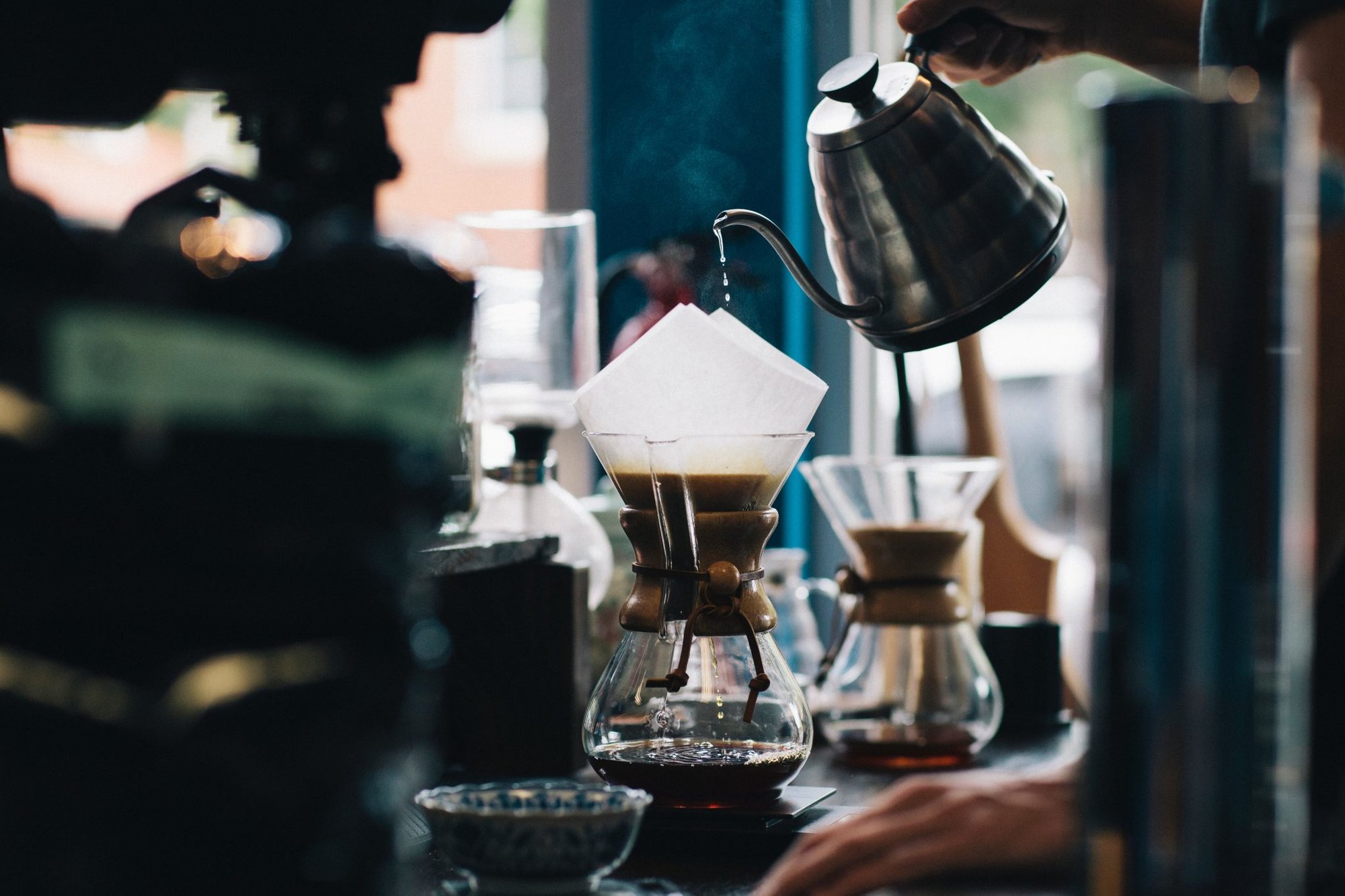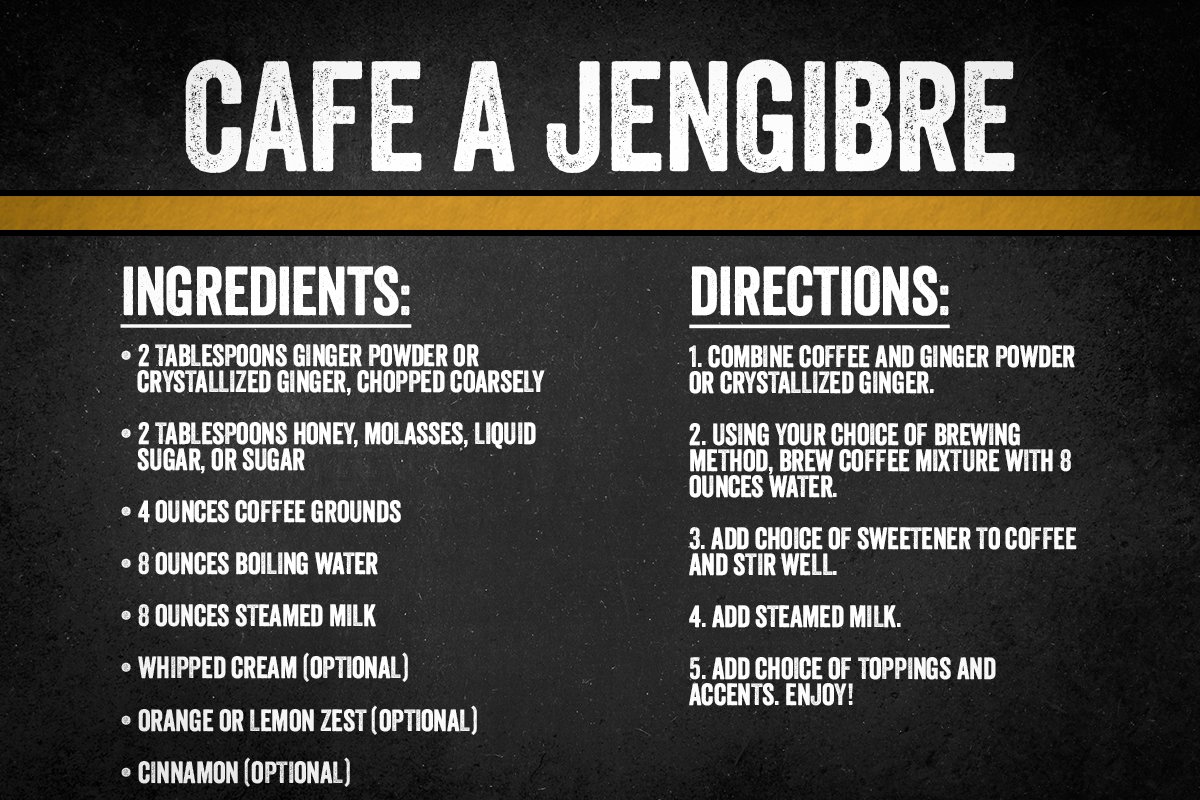
Stock photo by karl fredrickson/Unsplash.
As you crank up your radiator and reach for your coffee mug this winter season, you may find yourself seeking something different to spice up your morning (or afternoon) cup. While various warm holiday drinks line the cafe menus at the moment, there’s an easy way to duck out on the peppermint mochas and sugarplum lattes: the cafe a jengibre (hen-HEE’-bre). Spiced with ginger and sweetened with honey, this easy-to-make beverage gives a warm flavor profile to premium coffee.
There are a few ways to whip up this Colombian favorite depending on your preferences. The most traditional version uses dried ginger (either powder or the dehydrated root) and honey, but modern renditions incorporate a host of elements like crystallized ginger, candied orange peels, and gum syrup. The good news is there is no right way — use whatever you have handy. Once you get the proportions right, the flavors should strike a great balance with no particular note overshadowing the potency of your coffee. The ratios are simple: one part spice to one part sweetener and one part coffee to two parts steamed milk.
For the aromatic component, ginger powder or crystallized ginger would be your best options. The former provides a lighter ginger flavor without sweetness, which is better for those who don’t want their coffee muddied with additional sugar. On the other hand, crystallized ginger is alternatively called candied ginger, and rightfully so — it usually describes boiled ginger cooked with sugar that recrystallizes. It’s often a great way to add crunch and zest to otherwise bland dishes, but for this recipe, it’s a source of unparalleled sweetness and spiciness. The cooking process of crystallized ginger allows for a more concentrated flavor of the root. Since we’ll be brewing our coffee grounds with the ginger, however, neither option affects the prep time of our coffee in the least.

Now, as for coffee beans, cafe a jengibre is traditionally made with 4 ounces of any grounds you have on hand. But you may want to consider reaching for a light roast to round out your drink’s profile. There are a few reasons for this. One, light roasts are not roasted as long and as such contain a wider spectrum of fruitier and more floral notes. This by no means implies that your coffee won’t taste like coffee; it just means that the coffee’s flavor is more complex and offers further warmth to your beverage. Additionally, light roasts contain less oil, which helps emphasize the ginger’s clean flavor. That said, if you’re a dark roast aficionado, go for that. You can expect a deeper bitter coffee flavor, which can be a great base for the sweet and spicy cafe a jengibre.
Lastly, think about your sweetener and additional spices. Cafe a jengibre is classically made with honey, which offers a fantastic depth of flavor. Not a fan of the aftertaste of honey? Substitute sugar or liquid sugar. And for those seeking an even deeper (and maybe more gingerbread-esque) flavor, more recent renditions of the drink use molasses. Optional toppings like whipped cream can also accompany spices like orange zest, lemon zest, and cinnamon. These are great additions to elevate the flavors already brewed within the coffee and make the drink an extra indulgent treat.

BRCC and Bad Moon Print Press team up for an exclusive, limited-edition T-shirt design!
BRCC partners with Team Room Design for an exclusive T-shirt release!
Thirty Seconds Out has partnered with BRCC for an exclusive shirt design invoking the God of Winter.
Lucas O'Hara of Grizzly Forge has teamed up with BRCC for a badass, exclusive Shirt Club T-shirt design featuring his most popular knife and tiomahawk.
Coffee or Die sits down with one of the graphic designers behind Black Rifle Coffee's signature look and vibe.
Biden will award the Medal of Honor to a Vietnam War Army helicopter pilot who risked his life to save a reconnaissance team from almost certain death.
Ever wonder how much Jack Mandaville would f*ck sh*t up if he went back in time? The American Revolution didn't even see him coming.
A nearly 200-year-old West Point time capsule that at first appeared to yield little more than dust contains hidden treasure, the US Military Academy said.












